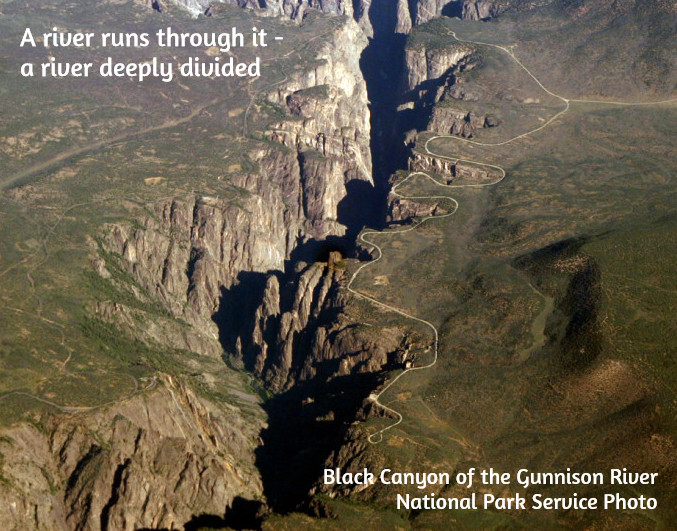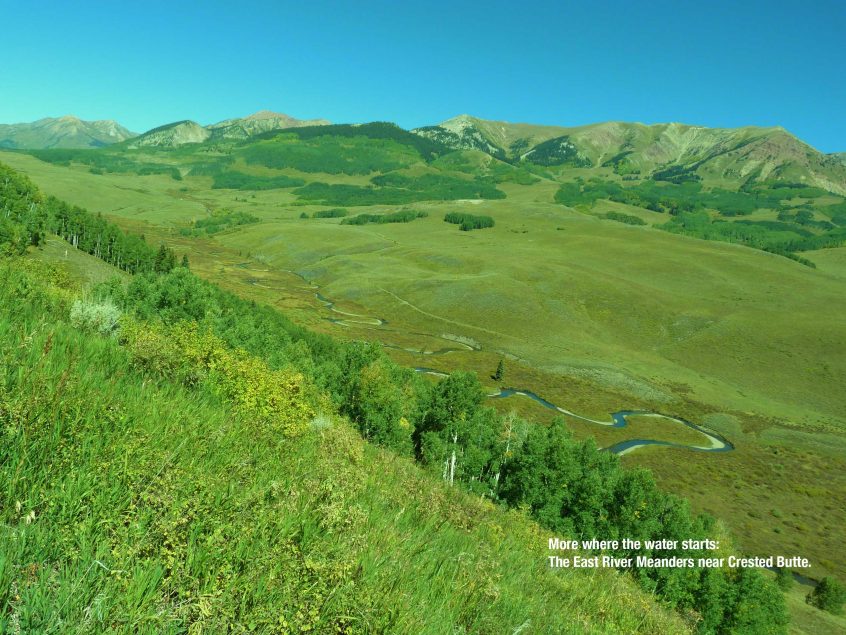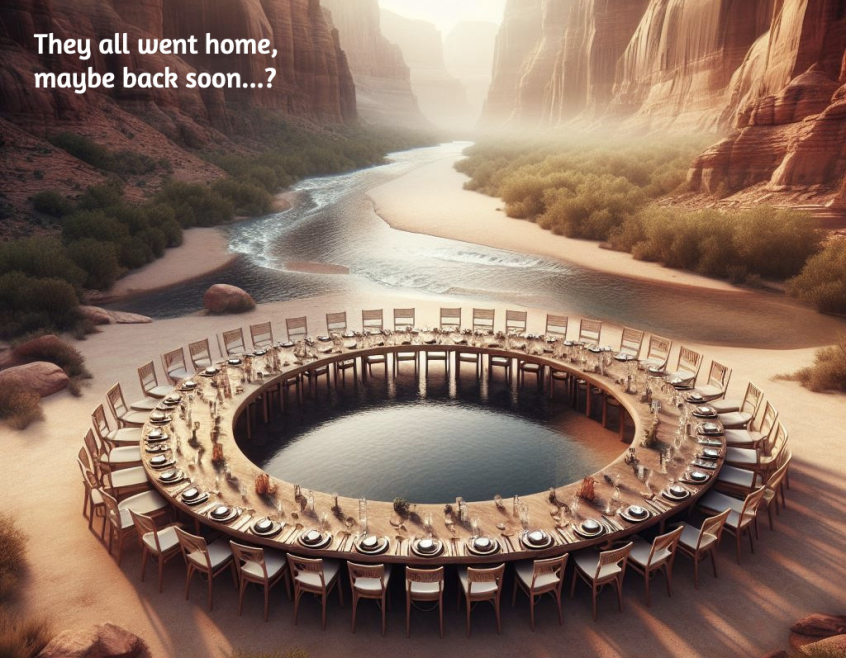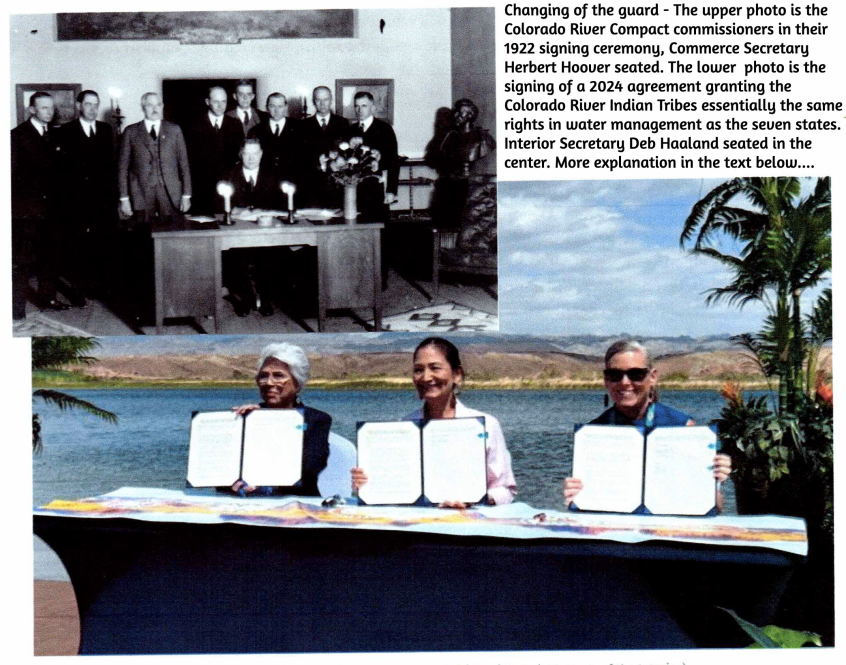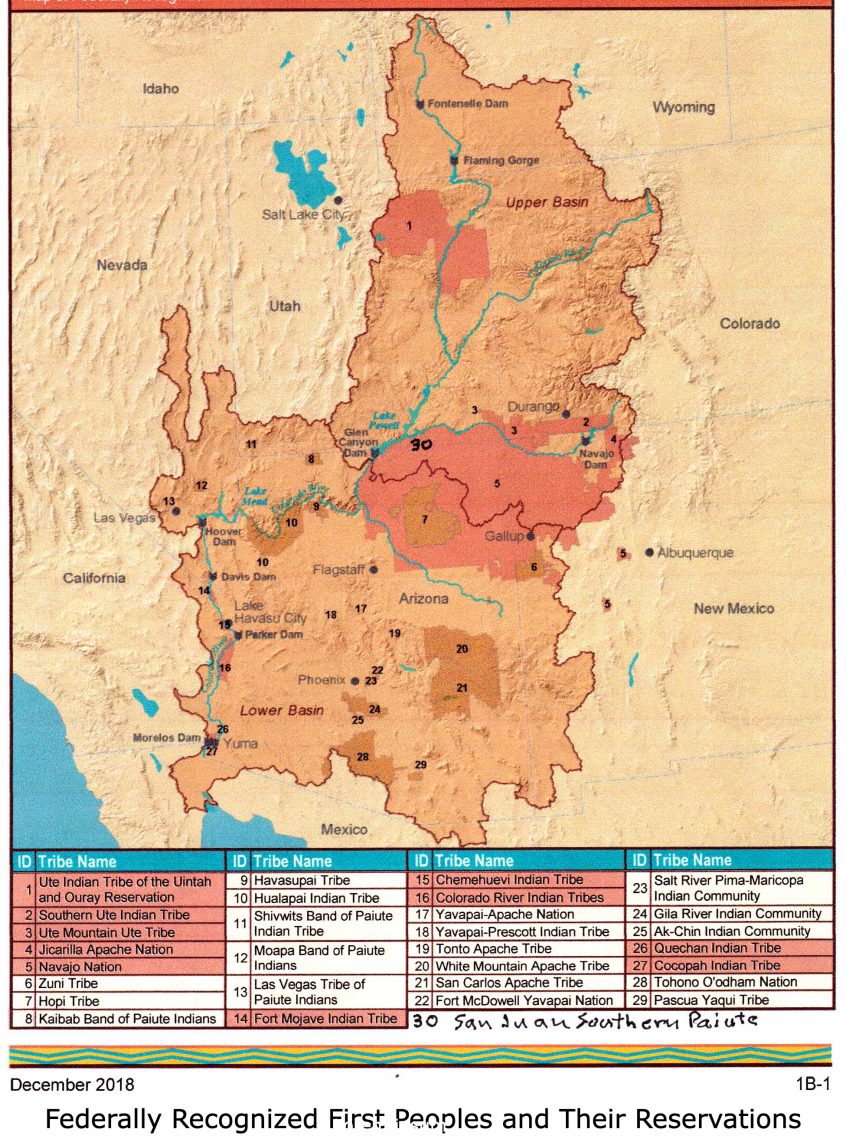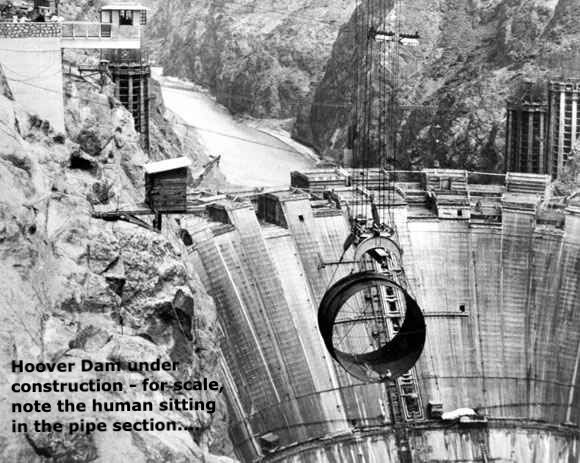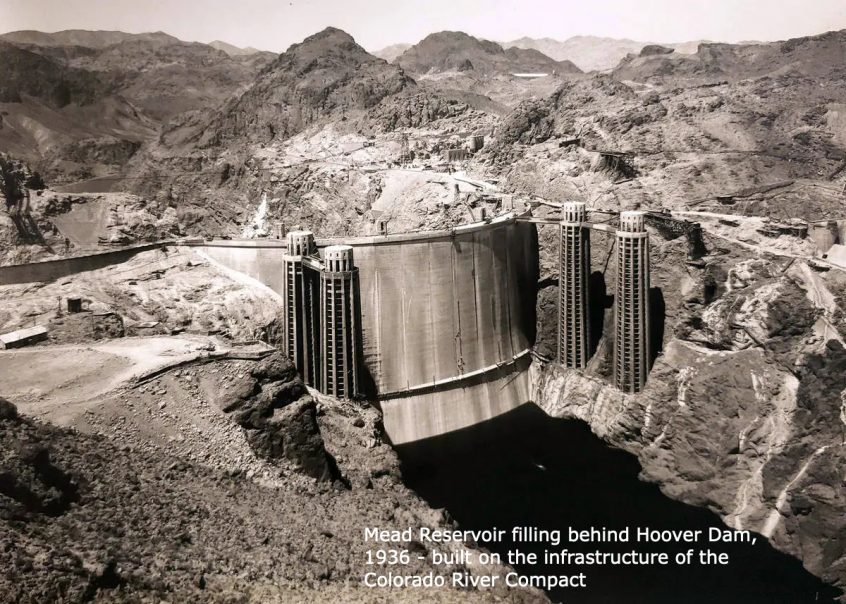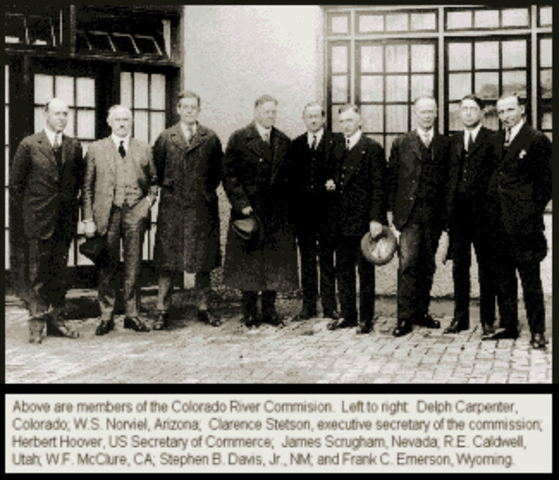Breaking news! The Lower Colorado River Basin is threatening the Upper Basin with a ‘Compact Call’ if it does not agree to share some major cuts in river use! Well, actually the news broke a week ago – and now there’s more news: just as I was wrapping this analysis of the ‘Call’ up yesterday, the Bureau put out for our consideration five options for river management up to and beyond the 2026 termination of the ‘Interim Guidelines.’ So we’ll interrupt our out-of-the-box exploration for management options for living with a desert river in an intelligent universe, and try to figure out what’s going on back in the surreal world of the ‘Compact box’ – looking at the ‘Call’ situation here, then get into the five management options in a couple weeks after the dust has settled. The Lower Colorado River Basin has attempted to break the stalemate between the two Compact-designated Colorado River Basins, by telling the Upper Basin … Read More
Romancing the River: The Headwaters Challenge 2
In the last two posts here (one of which you got twice, my apology), I’ve been trying to ‘revision’ the Colorado River as the classic desert river that it is. All rivers are composed of runoff – water from precipitation that did not soak into the ground, collecting in streams that ‘run off’ to the next lower watershed. Humid-region rivers receive new water from unused precipitation all the way along their course to the sea, but a river in the arid lands obtains nearly all of its water as runoff from a highland area high enough to force water vapor to condense into precipitation. The resulting runoff from that precipitation then flows down into the arid lands where it receives very little additional moisture and thus starts to diminish through natural processes on its way to the sea – evaporation under the desert sun, riparian vegetation use, absorption into low desert water tables. When the deserts are large enough, and … Read More
Romancing the River: Back to Basics?
Note in passing: this is the 50th post on this ‘weblog’ (a meaningful number to a ten-digit species). I am grateful to those who continue to open and even read these posts. I am obviously writing as much for my own edification and clarification as for yours, in the spirit of British writer E.M. Forster, who said, ‘I don’t know what I think until I see what I write.’ Working it out on paper, as we used to say, except now it is electrons on a screen only a little more organized than a starry night. Most of these posts have been about the Colorado River – a river I can say I ‘love’ in all the complexity that concept of engagement encompasses. I love its natural forms and contours, which leave me thinking that we need a ‘sur-’ category for nature – ‘surnature’ like ‘surreal’ is to ‘real’ – for natural phenomena that seem to be ‘beyond nature,’ at … Read More
Romancing the River: Win-winning the West and our Unimaginable Future
Way too much is happening in the world today, beyond the Colorado River. An Armageddon is shaping up in the mideastern Cradle of Too Many Civilizations that makes Colorado River problems look like sandlot scuffles; we’re in a long slog toward an election in the Untied (sic) States that would not even be close in a rational nation-state but somehow, ominously, is close here; a so-called Cold War is heating up again between competing military-industrial complexes that are again dragging us to the brink of unimaginable disaster. As if the changing climate were not already enough unimaginability. Much about our future is unimaginable today. Those apocalyptic challenges make a focus on my favorite river almost feel like a guilty diversion, but there’s a lot of fundamental roiling and boiling going on along and around the Colorado River too – a lot of it dependent on intelligent adaptation to unimaginables like the supercharged climate. Will the Upper and Lower River Basins … Read More
Romancing the River: The First Peoples, Part 1
We’re seeing not just being at the table, but actually having an influence on the agenda. We’re looking at the next step – because you can have a seat at the table, but not be taken seriously. And tribes, especially now in regards to water, we have to be taken seriously. – Stephen Roe Lewis, Governor Gila Indian River Community If you are following the ever-unfolding sagas of the Colorado River in the 21st century, the Early Anthropocene, you are probably aware that there are water-related issues with the 30 remaining First Peoples living within the Colorado River Basin. I’ll say, to start, that I don’t like to call the 574 recognized First Peoples in the United States and Alaska ‘Indians’ (colonizing and homogenizing term, inaccurate too), ‘American Indians’ (two Eurocentric colonizing words), or ‘Native Americans’ (anyone born here is a ‘native’). I prefer to think of them as ‘First People’ for a couple reasons. First, because many of the … Read More
Romancing the River: Meanwhile Back in Central Arizona
There’s a bit of a lull in the multiple conversations up and down the Colorado River Basin, with some positions staked out, while the Bureau of Reclamation initiates an ‘emergency environmental impact statement’ to ascertain, supposedly by late summer, what resolution it will either accept from the seven Basin states, or impose on the states, to reduce consumptive use throughout the Basin by two million acre-feet or more. All of this is of course being covered in the mainstream media as a ‘water war,’ in their constant efforts to pump any cultural exchange up to a ‘let’s you and him fight’ situation. To call cultural negotiations a ‘war,’ even noisy negotitions among parties with interests at stake, both trivializes the terrible nature of ‘war’ and casts the exchange in an often exaggerated aspect of belligerent violence. If you want to read about a Colorado River water war – fictional of course – pick up a copy of The Water Knife … Read More
Romancing the River: The Law of the River
“Now we have to come to terms with the fact that there are limits. That’s not the American way to recognize limits.” – Jack Schmidt, Director Center for Colorado River Studies University of Utah For the past several posts, we’ve been exploring the Colorado River Compact, commemorating its centennial this year. Nearly everything I have read about the Colorado River Compact in this centennial year – and it’s getting to be voluminous – speaks of it as the ‘foundation’ of ‘The Law of the River,’ an accumulation of legal and political documents accompanying the development of the Colorado River since the 1922 Compact. I have a problem with calling the Compact the ‘foundation’ of the Law of the River – as though before the Compact was adopted, the River was lawless. That is not true. The real foundation of the Law of the River is the appropriations doctrine that all seven states (or territories) had embraced in the 19th century … Read More
Romancing the River: The Colorado River Compact at 100
Have you heard of the wonderful one-hoss shay, That was built in such a logical way It ran a hundred years to a day … – Oliver Wendell Holmes We’ve been exploring the Colorado River Compact here – which, like Oliver Wendell Holmes’ ‘wonderful one-hoss shay’ has now lived almost ‘one hundred years to the day’ – the commissioners signed off on it November 24, 1922. The century mark is a good place to pause and pull back for a larger perspective on something like a multi-state agreement and see what it has and hasn’t actually accomplished – but without losing sight of the romantic vision of conquest that drove the Compact’s formation, back in the early decades of the Anthropocene Epoch when reorganizing the prehuman world was still fun. In the last post here, we looked at the ‘major purposes’ cited in the first article of the Compact: the first listed purpose, ‘to provide for the equitable division and … Read More
Romancing the River: Onward and – well, onward with the Colorado River Compact
If any drink [of the Hassayampa], they can no more see fact as naked fact, but all radiant with the color of romance. – Mary Austin Before getting into the Colorado River again, I want to put out a plea: Please recognize the importance of the coming ‘midterm elections.’ Especially if you live in one of 15 percent of our congressional districts that has not been gerrymandered to a foregone outcome. This is a ‘tipping point’ election, not between two political parties trying to work things out, but between two political concepts with no middle room for compromise: if both houses of Congress tip toward the Republicans this election, rather than remaining barely tipped toward the Democrats, then we are going to be taking a big bumbling step toward authoritarian governance, and away from our evolving American experiment in government by, for and of the people. I think I’m probably preaching to the choir here, but please do what you … Read More
Romancing the River: Colorado River Compact, Part 2 – Divide to Conquer
“Have you heard of the wonderful one-hoss shay, That was built in such a logical way It ran a hundred years to a day … – Oliver Wendell Holmes The last episode here ended with representatives of the seven Colorado River Basin states gathering in Washington, DC, as a commission charged, in the words of Herbert Hoover, U.S. Commerce Secretary and Chair of the Commission, ‘to consider and if possible to agree upon a compact between the seven states … providing for an equitable division of the water supply of the Colorado River and its tributaries amongst the seven states.’ He went on to note that ‘this Conference is unique in its attempt to determine states’ rights over so large an area by amiable agreement.’ That was in January 1922; in 2022 we commemorate the centennial of a compact created by the Commission and ratified by six of the seven states and the U.S. Congress, enabling the controlling and harnessing … Read More
- Page 1 of 2
- 1
- 2
